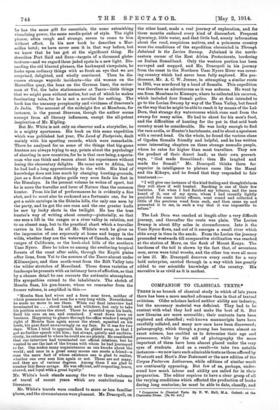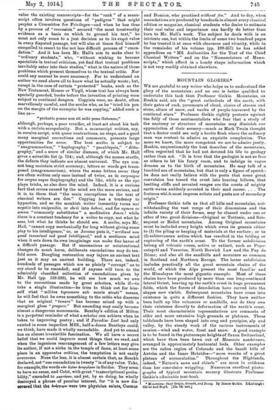COMPANION TO CLASSICAL TEXTS.*
THERE is no branch of classical study in which of late years there has been a more marked advance than in that of textual criticism. Older scholars lacked neither ability nor industry, but the necessary material was deficient. They had to be content with what they had and make the best of it. But now libraries are more accessible ; their contents have been explored and classified; well-known manuscripts have been carefully collated, and many new ones have been discovered; palaeography, which though a young has become almost an exact science, has enabled us to determine their age and provenance, while by the aid of photography the more important of them have been almost placed under the very eyes of students. And as a result—to take two notable instances—we now have such admirable texts as those offered by Westeott and Hort's New Testament or the new edition of the Corpus Poetarurn Latinorum, while editions of similar merit are continually appearing. But few of us, perhaps, under- stand how much labour and ability are called for in their preparation. The editor requires to have a clear grasp of all the varying conditions which affected the production of books during long centuries; he must be able to date, classify, and • Companion to Monica Tees. By F. W. Hall, M.A. Orford: at the Clarendon Press. [Os. 6d. net.)
value the existing manuscripts—for the "rank" of a manu- script often involves questions of "pedigree" that might perplex a Committee for Privileges—and when be has thus by a process of "recension" secured "the most trustworthy evidence as a basis on which to ground his text," he must not only come to a just decision as to its exict value in every disputed passage, but will also at times find himself compelled to resort to the not less difficult process of "emen- dation." And it has been Mr. Hall's aim to make clear to "ordinary students," who, "without wishing to become specialists in textual criticism, yet find that textual problems inevitably enter into their studies," what is the nature of those problems which present themselves to the textual critic. Nor could any manual be more necessary. For to understand an author we need above all to know what he actually wrote; but, except in the case of certain "protected" books, such as the New Testament, Homer or Virgil, whose text has always been specially guarded, books before the invention of printing were subject to continual dangers. Copyists were, no doubt, often marvellously careful, and the scribe who, as be " tried his pen on the margin of the exemplar he was copying," added such a line as- "probatio penne non sit mibi pens Gehenna,"
although, perhaps, a poor versifier, at least set about his task with a cerium scrupulosity. But a manuscript written, say, in cursive script, with queer contractions, no stops, and a good many marginal corrections and comments, presents large opportunities for error. The best scribe is subject to "anagrammatism," "haplography," " parablepsia," " ditto- graphy," and a score of similar diseases, of which Mr. Hall gives a scientific list (p. 154); and, although the names startle, the defects they indicate are almost universal. The eye can- not long maintain strict accuracy; letters or words get trans. posed (anagrammatism), where the same letters recur they are often written only once instead of twice, as in corpusque for corpus usque (haplography) and the like, while as the eye plays tricks, so also does the mind. Indeed, it is a curious fact that errors caused by the mind are the more serious, and it is to them that "the main corruptions in the text of classical writers are due." Copying has a tendency to hypnotize, and so the monkish writer insensibly turns uni negotio into unigenitio, or ebrii into hebrei, and for agmen or amem "commonly substitutes" a meditative Amen ! while there is a constant tendency for a writer to copy, not what he sees, but what be thinks he should see. A scribe, says Mr. Hall. "cannot copy mechanically for long without giving some play to his intelligence," or, as Jerome puts it, "scribunt non quod inveniunt sect quod intelligunt," and a mediocre mind when it sets down its own imaginings can make fine havoc of a difficult passage. But if unconscious or unintentional changes do much harm, deliberate emendations may do ten- fold more. Bungling restoration may injure an ancient text just as it may an ancient building. There are, indeed, hundreds of passages which are so plainly "corrupt" as to cry aloud to be emended; and if anyone will turn to the admirably classified collection of emendations given by Mr. Hall (pp. 158-198), he will see bow much we owe to the corrections made by great scholars, while if—to take a single illustration—he tries to think out for him- self what " milites tepromere sub mnris strati" means, he will feel that he owes something to the critic who discerns that an original "temere" has become mixed up with a marginal gloss "propere." But emending may easily become almost a dangerous monomania. Bentley's edition of Milton is a perpetual reminder of what a scholar can achieve when he takes to improving poetry ; and if Paradise Lost had only existed in some imperfect MSS., half-a-dozen Bentleys could, we think, have made it wholly unreadable. And yet to emend has an almost irresistible fascination. We all have a secret belief that we could improve most things that we read, and when the ingenious rearrangement of a few letters may give its author, if not a niche in the temple of fame, at least some place in an apparatus milieus, the temptation is not easily overcome. None the less, it is almost certain that, as Boeckh declared, not " one emendation in twenty "is of any value. Take, for example,tbe words van dyfnv armrytpoy in Suidas. They seem to have no sense, and Colet, with great " transcriptional proba- bility," emended to papr4por, and yet, by so doing, be wholly destroyed a phrase of peculiar Interest, for " it is now dis- covered that the &Pimp« were two physician saints, Comm and Damian, who practised without fee." And to-cloy, when emendations are produced by hundreds in almost every classical edition or magazine, classical students who desire to estimate their real value and importance can hardly do better than turn to Mr. Hall's work. The subject he deals with is an intricate one, but within the limits of some two hundred pages he has treated it at once with clearness and vivacity, while in the remainder of his volume (pp. 198-357) he has added appendices on "MS. Authorities for the Text of the Chief Classical Writers" and on the "Nomenclature of Mann. scripts," which afford in is handy shape information which is not very readily obtained elsewhere.















































 Previous page
Previous page